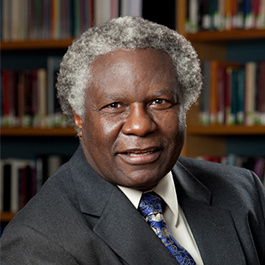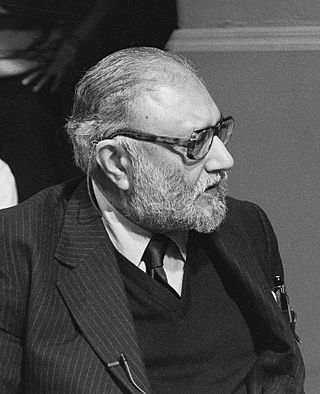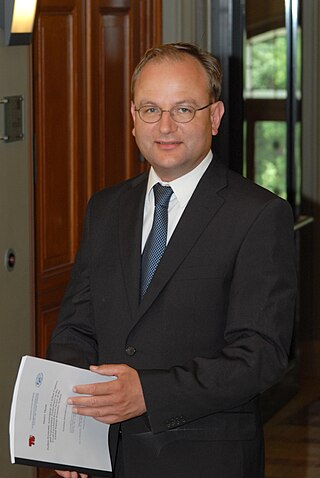Related Research Articles

Jeffrey David Sachs is an American economist and public policy analyst who is a professor at Columbia University, where he was former director of The Earth Institute. He worked on the topics of sustainable development and economic development.

Lahore University of Management Sciences (LUMS) (Urdu: لاہور یونیورسٹی آف مینجمنٹ سائنسز) is a private research university in Lahore, Punjab, Pakistan.

Calestous Juma was a Kenyan scientist and academic, specializing in sustainable development. He was named one of the most influential 100 Africans in 2012, 2013 and 2014 by the New African magazine. He was Professor of the Practice of International Development and Faculty Chair of the Innovation for Economic Development Executive Program at Harvard Kennedy School. Juma was Director of the School's Science, Technology and Globalization Project at Harvard Kennedy School as well as the Agricultural Innovation in Africa Project funded by the Bill and Melinda Gates Foundation.

The Higher Education Commission is a statutory body formed by the Government of Pakistan which was established in 2002 under the Chairmanship of Atta-ur-Rahman. Its main functions are funding, overseeing, regulating and accrediting the higher education institutions in the country.

The Frederick S. Pardee RAND Graduate School is a private graduate school associated with the RAND Corporation in Santa Monica, California. The school offers doctoral studies in policy analysis and practical experience working on RAND research projects to solve current public policy problems. Its campus is co-located with the RAND Corporation and most of the faculty is drawn from the 950 researchers at RAND.
The Global Scenario Group (GSG) was an international, interdisciplinary body convened in 1995 by the Tellus Institute and the Stockholm Environment Institute (SEI) to develop scenarios for world development in the twenty-first century. Further development of the Great Transition scenarios has been carried on by the Great Transition Initiative (GTI).

The Tellus Institute is an American non-profit organization established in 1976 with the aim of bringing scientific rigor and systemic vision to critical environmental and social issues. Tellus has conducted thousands of projects throughout the world, and now focuses on the global future and how to shape it.

Paul Raskin is the founding president of the Tellus Institute, which has conducted over 3,500 research and policy projects throughout the world on environmental issues, resource planning, scenario analysis, and sustainable development. His research and writing has centered on propagating the Great Transition. Raskin has served as a lead author on a number of high-profile international reports, including the U.S. National Academy of Science's Board on Sustainability, the Millennium Ecosystem Assessment, the United Nations Environment Programme's Global Environment Outlook, the Earth Charter, and the Intergovernmental Panel on Climate Change (IPCC) Third Assessment Report.
Great Transition is used by the Great Transition Initiative and its predecessor, the Global Scenario Group (GSG), to describe a vision of a just and sustainable global future. The term was originally coined by Kenneth E. Boulding in The Meaning of the 20th Century – The Great Transition (1964) and describes the shift from pre-modern to post-modern culture, and the four possible courses of action that these organizations believe will allow humanity to successfully manage the Great Transition.

National Commission on Status of Women (NCSW) is a Pakistani statutory body established by the President Pervez Musharraf, under the XXVI Ordinance dated 17 July 2000. It is an outcome of the national and international commitments of the Government of Pakistan like Beijing Declaration and Platform for Action, 1995; and 1998 National Plan of Action (NPA) for Women, 1998.
Robert W. Kates was an American geographer and independent scholar in Trenton, Maine, and University Professor (Emeritus) at Brown University.
Simon Zadek is a writer and advisor, focused on business and sustainability. He is the Co-CEO of NatureFinance, a non-profit organization aiming to align global finance with nature positive outcomes.

Science and technology have been pivotal in Pakistan's development since its inception. The country boasts a large pool of scientists, engineers, doctors, and technicians actively contributing to these fields.
The Planning Commission is a financial and public policy development institution of the Government of Pakistan. The Commission comes under Ministry of Planning Development & Special Initiatives The Planning Commission undertakes research studies and state policy development initiatives for the growth of national economy and the expansion of the public and state infrastructure of the country in tandem with the Ministry of Finance (MoF).

Ottmar Georg Edenhofer is a German economist who is regarded as one of the world's leading experts on climate change policy, environmental and energy policy, and energy economics. His work has been heavily cited. Edenhofer currently holds the professorship of the Economics of Climate Change at Technische Universität Berlin. Together with Earth scientist Johan Rockström, economist Ottmar Edenhofer is scientific director of the Potsdam Institute for Climate Impact Research (PIK), representing the interdisciplinary and solutions-oriented approach of the institute. Furthermore, he is director of the Mercator Research Institute on Global Commons and Climate Change (MCC). From 2008 to 2015 he served as one of the co-chairs of the Intergovernmental Panel on Climate Change (IPCC) Working Group III "Mitigation of Climate Change".

K M Baharul Islam is presently the Chairperson of Centre of Excellence in Public Policy and Government at Indian Institute of Management Kashipur. He served as the Dean (Academics) during 2019-2021 at the same institute. He was elected as a Fellow of the Royal Asiatic Society of Great Britain and Ireland on 18 March 2020. Since October 2021, he is a visiting professor at the London School of Economics.

Pavan Sukhdev is an Indian environmental economist whose field of studies include green economy and international finance. He was the Special Adviser and Head of UNEP's Green Economy Initiative, a major UN project suite to demonstrate that greening of economies is not a burden on growth but rather a new engine for growing wealth, increasing decent employment, and reducing persistent poverty. Pavan was also the Study Leader for the ground breaking TEEB study commissioned by G8+5 and hosted by UNEP. Under his leadership, TEEB sized the global problem of biodiversity loss and ecosystem degradation in economic and human welfare terms, and proposed solutions targeted at policy-makers, administrators, businesses and citizens. TEEB presented its widely acclaimed Final Report suite at the UN meeting by Convention on Biological Diversity (CBD) in Nagoya, Japan.

Sania Nishtar SI FRCP, is a Pakistani physician, cardiologist, senator, author and activist who was appointed CEO of Gavi, the Vaccine Alliance in 2024. Nishtar previously served as Special Assistant on Poverty Alleviation and Social Safety to the Prime Minister of Pakistan, with the status of Federal Minister, and chairperson Ehsaas Programme. She was elected to the Senate of Pakistan in the 2021 Senate election from Khyber Pakhtunkhwa. Previously she served in the interim federal cabinet in 2013 overseeing public health, education and science.
Balochistan Rural Support Programme (BRSP) was a project funded by the German technical cooperation agency Deutsche Gesellschaft für Internationale Zusammenarbeit (GIZ) in the early 1980s which was converted into the Balochistan Rural Support Programme in 1991. It is a Non Government Organization (NGO), part of the Rural Support Programmes Network, working in rural areas of Balochistan, Pakistan.

Khawar Mumtaz is a Pakistani women's rights activist, feminist author and university professor. She is the Former Chairperson of the National Commission on the Status of Women (NCSW) who served for three consecutive terms from 2013 to 2019.
References
- ↑ "Harvard-educated Dr Tariq Banuri to head HEC" . Retrieved 20 November 2018.
- ↑ "Tariq Banuri takes charge as fourth HEC chairperson - The Express Tribune". 1 June 2018. Retrieved 20 November 2018.
- 1 2 3 Wazir, Hamid Khan (28 May 2015). "Dr Tariq Banuri appointed as HEC chairman". Pakistan Today . Archived from the original on 2 May 2023. Retrieved 20 November 2018.
- ↑ "Dr. Tariq Banuri Appointed as New Chairperson of HEC". propakistani.pk. Retrieved 20 November 2018.
- 1 2 3 "Tariq Banuri". Great Transition Initiative . Archived from the original on 30 November 2024. Retrieved 30 November 2024.
- ↑ "About". Great Transition Initiative . Archived from the original on 20 December 2003.
- ↑ "Tariq Banuri, Director, Division for Sustainable Development/CSD Secretariat" (PDF). United Nations . Archived (PDF) from the original on 30 November 2024. Retrieved 30 November 2024.
- ↑ "CEESP Contacts" (PDF). International Union for the Conservation of Nature . Issue no. 6. Policy Matters. December 1999. Archived (PDF) from the original on 6 December 2024. Retrieved 6 December 2024.